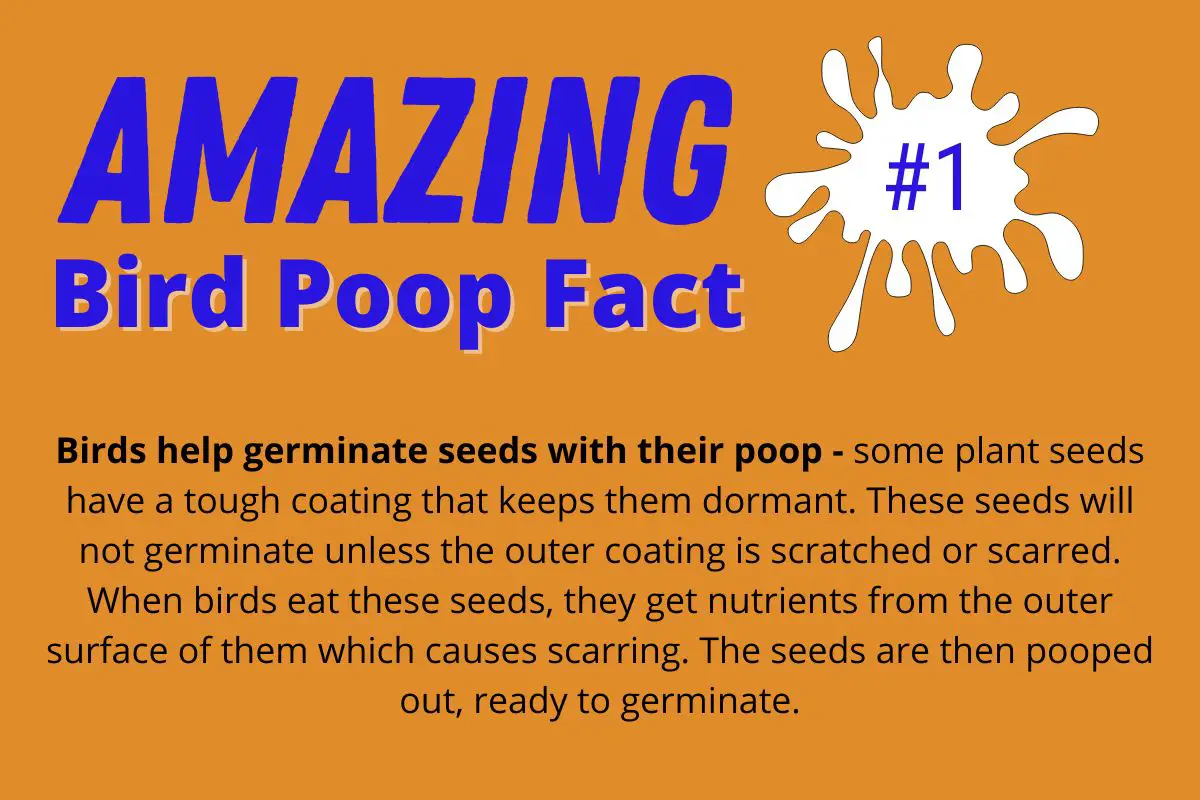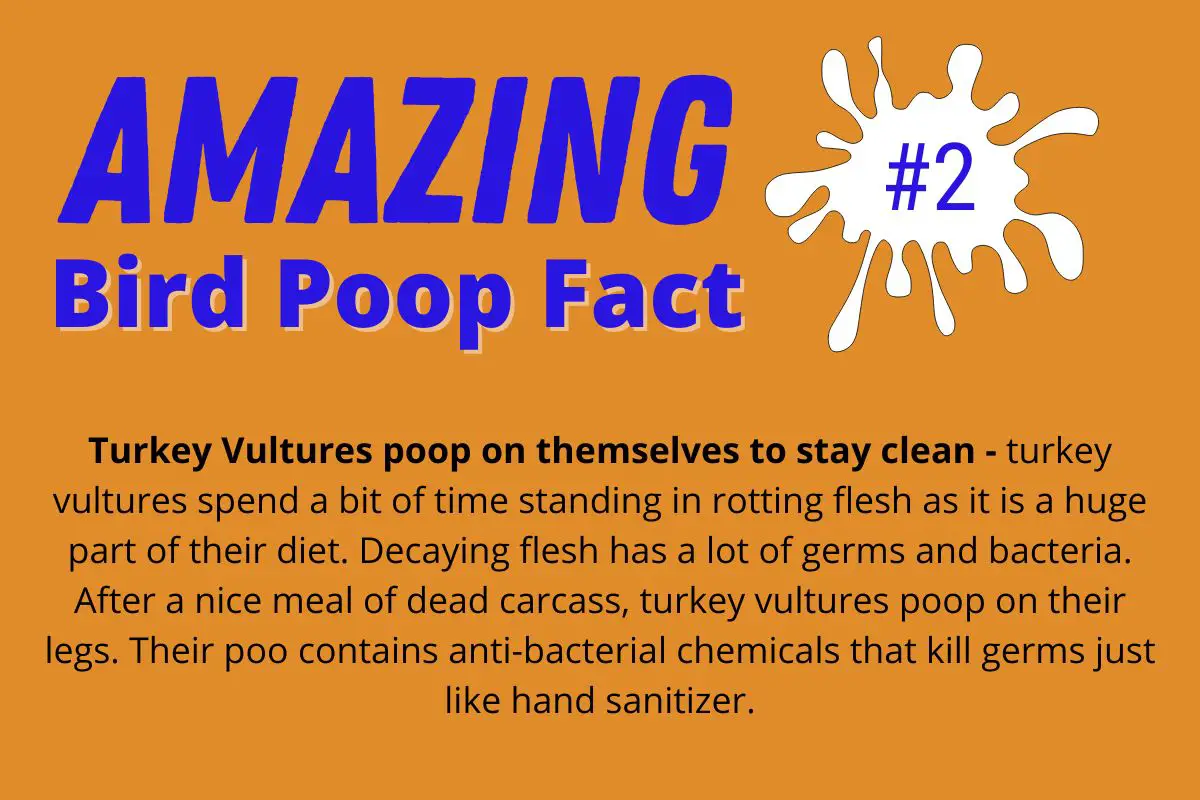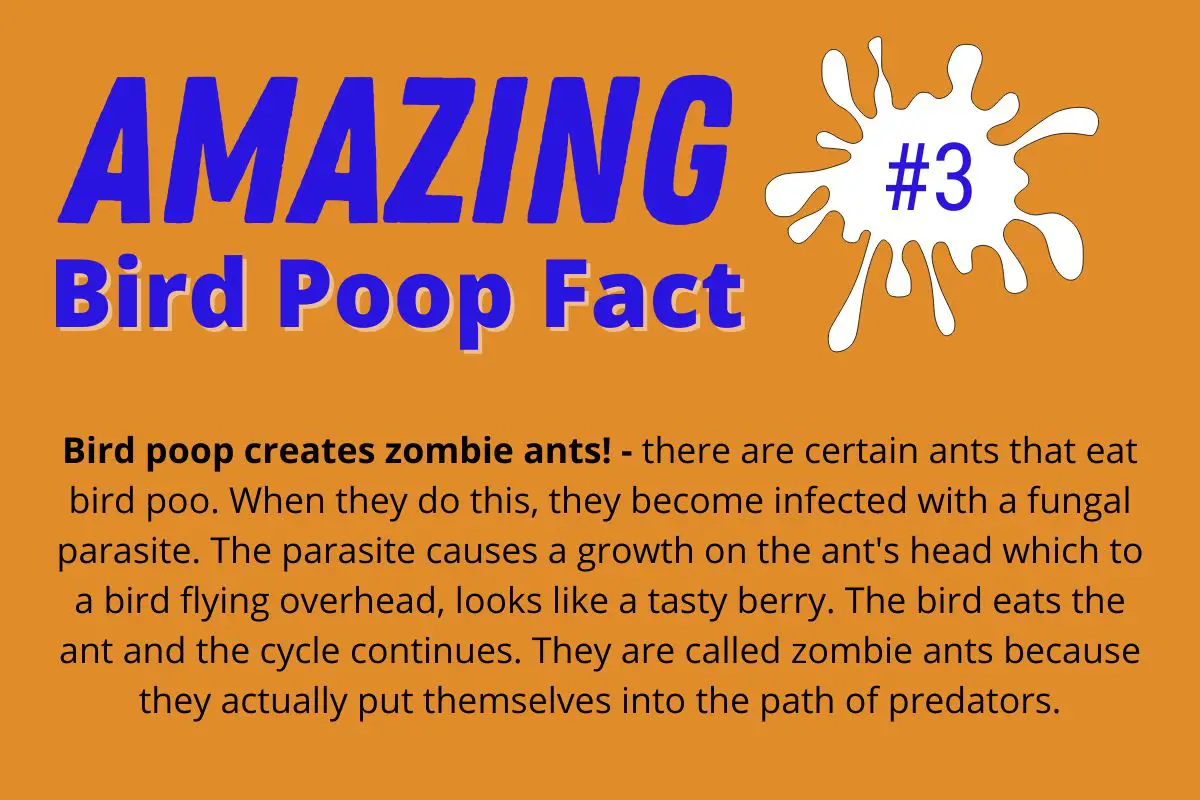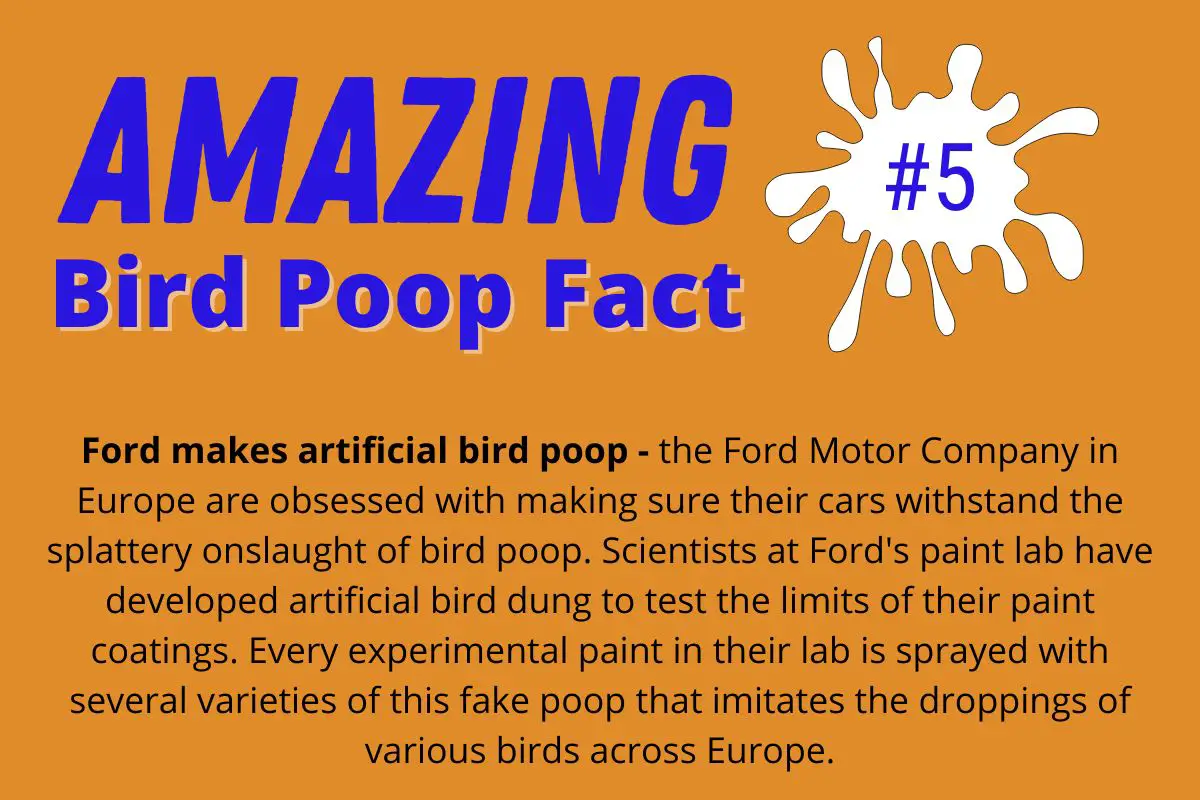I have to be honest, I’m not even really sure why you are searching for an answer to this question?! Don’t feel weird though, you are not the only one. This article will answer your question about how often birds poop and many other things about what comes out of a bird’s back end.
How often a bird poops depends on the size of the bird and its diet. Small birds may poop every 10 to 15 minutes, whereas a large bird such as an Ostrich may poop every 3hrs. Studies on the rate of food passage through the digestive tracts of Sparrows recorded times between 1hr 2min and 1hr 42mins.
Birds need to stay light in order to fly so having a quick digestive process is in their best interests. Keep reading to discover more interesting facts about bird poop.
Why Do Birds Poop So Much?
Birds poop so much because they have a special digestive system designed to process their food quickly. Flying requires a lot of energy so birds need to eat a lot during the day. Many birds consume a fifth of their body weight daily. Their digestive system is a fast and efficient energy machine.
We only have one stomach whereas birds have two. Not only that but they also have an enlarged area in their esophagus called a Crop where food can be stored and either eaten later or regurgitated to feed their young.
In the diagram below you can see the digestive system of a Mallard Duck:
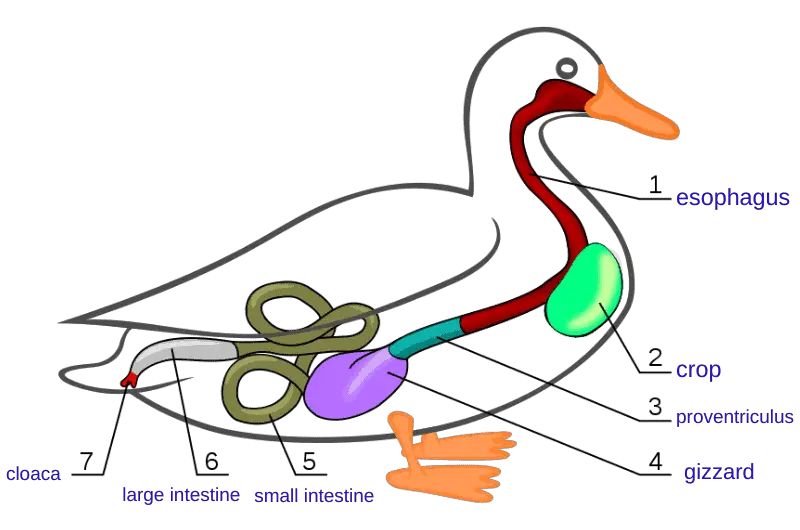
Below the Crop you can see the Proventriculus and the Gizzard, these are the bird’s two stomachs. The Proventriculus breaks food down with strong acid while the Gizzard is a strong, muscular stomach for grinding and smashing up tougher food particles. For a more detailed description of the digestive system of a bird, read my post Can Birds Fart? – I smell something nasty?!
The average male Duck poops every 15 to 30 minutes. If they did not do this all the food they eat would just be sitting there in their digestive system. This is a lot of extra weight that a duck just doesn’t need if it has to make a quick getaway from a predator. Nature has provided Ducks and other birds with the perfect digestive system for their needs.
Which Birds Poop Every 15 Minutes?
There are many birds that poop every 12-15 minutes, including Budgies, Cockatiels, and Lovebirds. A lot of these species are kept as pets and thus are easily observed. The time between poops might be different for wild birds and would most certainly be diet-dependent.
A lot of Budgie (Parakeet) owners report them pooping at least 40 to 50 times a day. If we assume they are not watching their birds 24 hours a day, this works out at one poop about every 12 to 15 minutes (in an 8-hour period). Budgies also poo when they sleep so this figure could be higher.
Discover more about how birds digest their food in this article here on my blog.
Some Shit Science
You may not believe it but some people have done tests to figure out the amount of time it takes a bird to poop something out.
At the Baldwin Bird Research Laboratory in Gates Mills, Ohio, tests were conducted on passerine birds (songbirds) and published in the Wilson Bulletin in December 1933. Over 200 birds were caught across various seasons and unfortunately cut open to examine the contents of their stomachs.
Birds were taken at various times of the day but not at night. It was found that less than 10 of the 200 had stomachs that were empty. This proved that these small birds were not filling their crops and stomachs and waiting until they were empty before refilling them, but eating from time to time.
A study was also conducted on the rate of passage of food through the digestive tract. Birds were kept in cages outside the laboratory for at least 2 hours without food and were then fed finely cracked corn stained with red, violet, or green dye. The birds were placed in a special cage where they could be observed without disturbing them and watched to notice the first appearance of dye in their poop.
Below is a table showing the results of this study:
| Species | Average time until first colored poop | Shortest time recorded |
|---|---|---|
| Song Sparrow (Juvenile) | 1 hour 34 minutes | 58 minutes |
| Song Sparrow (Adult) | 1 hour 42 minutes | 1 hour 22 minutes |
| Eastern Chipping Sparrow (Juvenile) | 1 hour 18 minutes | 1 hour |
| Eastern Chipping Sparrow (Adult) | 1 hour 2 minutes | NA |
| Eastern Field Sparrow (Juvenile) | 1 hour 37 minutes | 1 hour 14 minutes |
| Eastern Field Sparrow (Adult) | 1 hour 41 minutes | NA |
| English Sparrow (Juvenile) | 1 hour 25 minutes | NA |
| Red-eyed Towhee (Juvenile) | 1 hour 32 minutes | 1 hour 20 minutes |
| Five Species Fringillidae (Finches) | 1 hour 32 minutes | NA |
Other birds were fed Raspberries or Insects and their times are recorded below:
| Species | Fed | Average time until first colored poop |
|---|---|---|
| Cedar Waxwing (Juvenile) | Raspberries | 1 hour 40 minutes |
| Scarlet Tanager (Adult) | Beetle and Moth Larvae – Mealworms | 1 hour 25 minutes |
Scientists also recorded the average length of time between the last stained food eaten and the last colored excrement voided:
| Species | Average time |
|---|---|
| Song Sparrow | 2 hours 14 minutes |
| Eastern Field Sparrow | 2 hours 30 minutes |
Earlier Studies
Perhaps the earliest studies done on the passage of food through the digestive tracts of birds were done by H. Weiske in 1878.
Weiske fed 2 geese on dandelion leaves for 8 days, then abruptly changed to feeding them barley grains. The grains appeared in the bird’s fecal matter in 3 hours and 25 minutes. Around 6½ hours after changing to the barley Weiske observed the birds pooping only barley and no green from the dandelion leaves.
Another study by T.G Browne in 1922 determined the time required for food to pass through the digestive tracts of chickens. Browne recorded times based on whether the bird’s crop was full or empty. He found that oats fed to a chicken with an empty crop appeared in its poo within 5 to 6 hours. A full crop emptied within 18 to 20 hours. An entire meal of oats passed within 27 to 28 hours.
Another interesting discovery Browne made is that liquids did not pass entirely through the digestive tract at once, though some passed immediately into the intestine. No liquids at all were retained in the gizzard.
You can read more about other studies done on poultry in this article from the Journal Of Agricultural Research (April 15, 1927).
Do Birds Poop And Pee At The Same Time?
Birds poop and pee at the same time. In fact, birds have one orifice called a Cloaca (also called a Vent) which serves as the only opening for the digestive, reproductive, and urinary tracts. Birds poop, pee and reproduce and lay eggs via this one opening.
The digestive system of birds is truly remarkable. As with most things designed by nature, it is truly perfect. It’s all designed for flight.
The absence of a bladder is another way in which birds’ bodies are made lighter. If they had to carry around full bladders it would make flying much more difficult.
Building the reproductive organs into the system as well also keeps the whole system more streamlined and much lighter.
The reproductive systems of birds are explained in more detail in this article.
Can Birds Control When They Poop?
Birds can not control when they poop as they do not have the same muscled sphincter that humans do. However, pet birds can be “potty trained” (trained to poop in certain places) though this can cause cloacal prolapse where the inner tissues of the cloaca protrude from the vent.
Some people know the embarrassment of being pooed on from a great height by an unwitting bird. I will never forget the first time it happened to me (yes, it’s happened more than once!). I was perhaps 6 or 7 years old, sitting with my family by the Yarra River in Melbourne, Australia having a picnic. All of a sudden, I felt a light slap on my shoulder.
When I looked to see what had hit me I was at first a little confused. As soon as my Mum said, “Oh a bird has pooed on you?!” I began to cry. People walking by were looking on and snickering at the huge splatter of poo on my shoulder and the embarrassment was too much for me.
It is obvious that birds know when they have to poop. If you’ve ever observed a Pied Cormorant down at the beach, they will stick their bum out (well, their tail) before they squirt out a long stream of excrement. This tells us they are aware of needing to do so.
Birds are not however aware of what is behind or below them when they do poop. Or perhaps they are and they simply don’t care! I do feel bad for the poor, unfortunate Penguin at 36 seconds into this video, though it really should just MOVE?!
Why Is Bird Poop White?
Now, most of the stuff that birds eat is not white so why does their poop come out white?
Bird poop is white because it’s a mix of fecal matter and uric acid. The human body breaks down proteins into urea and mixes them with water to produce urine. Birds excrete nitrogenous waste from breaking down proteins such as uric acid, which is white and pasty. The dark center of their poop is feces.
We are most familiar with the white splatterings all over our cars, statues, buildings, and park benches. However, not all bird poop is white. Some birds will poo purple if they eat certain types of berries. Parrot’s poo is green with specs or streaks of white. Australian Emus, depending on where they are will poo dark green or brown.
Learn more about how birds get rid of waste from their bodies in this article on my blog.
Why Are Bird Nests Not Covered In Poop?
This is pretty gross so if you don’t want to read this (or see it!), just scroll down a bit.
While researching this article, I came across a YouTube video by Vox in which a lady discovered a nest of American Robins on her porch swing. The nest initially had one tiny blue egg in it and then another 3 eggs appeared.
She began filming everything that was happening in and around the nest for a few weeks during lockdown. Many questions arose in her mind about these little birds but mostly she wanted to know why the nest was not full of poop. This is a really interesting video and I do suggest watching it but you may be a tiny bit grossed out at the answer to that question.
Baby birds poop in tiny little sacks called fecal sacks. They are kind of like baby bird nappies that keep the poop contained so it doesn’t mess up the nest. The gross part though…….the adult birds grab it right from their little butts and eat it?!
Watch the video if you have a strong stomach:
Let’s Wipe It Up…I Mean Wrap It Up!
Whew?! That is a lot of info about bird poop, probably more than you ever wanted to know. What have we learned?
- birds poop anywhere from every 10 minutes to every 3 hours.
- birds poop so much because they need to offload the weight in order to fly.
- birds have two stomachs and their whole digestive system is designed to keep their weight down for flight.
- the average male Duck poops every 15-30 minutes.
- Budgies, Cockatiels, and Lovebirds poop every 12 to 15 minutes.
- in the 1800s and 1900s, many scientists thought about bird poop probably a little too much?!
- birds poo and wee at the same time.
- the Penguin in that video will never be the same again.
Go forth into the world and spread your knowledge of bird poop to everyone you meet. Judging by the reaction I got from my mum, my wife, and my daughter – they will love it?!
References
- Experiments on the digestion of food by birds – James Stevenson
- Bird Digestion – Robert Snedden
- The Essential Guide To Duck Pooping – Rahuul C Pareek
- A Review of Ugiusu No Fun – Kaitlyn McLintock

